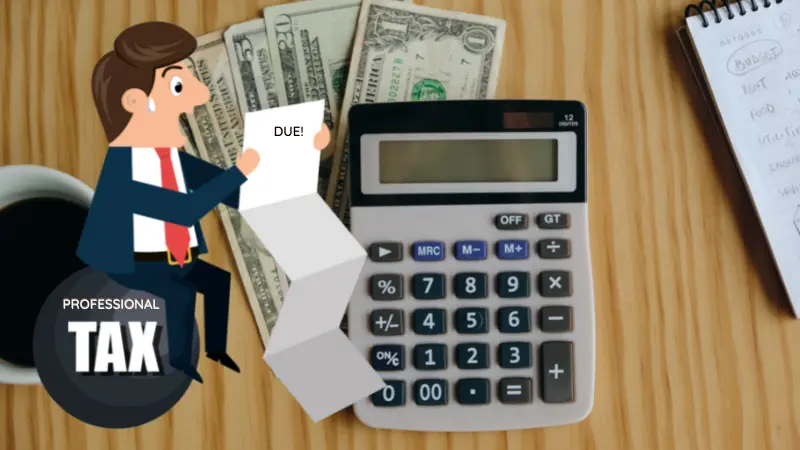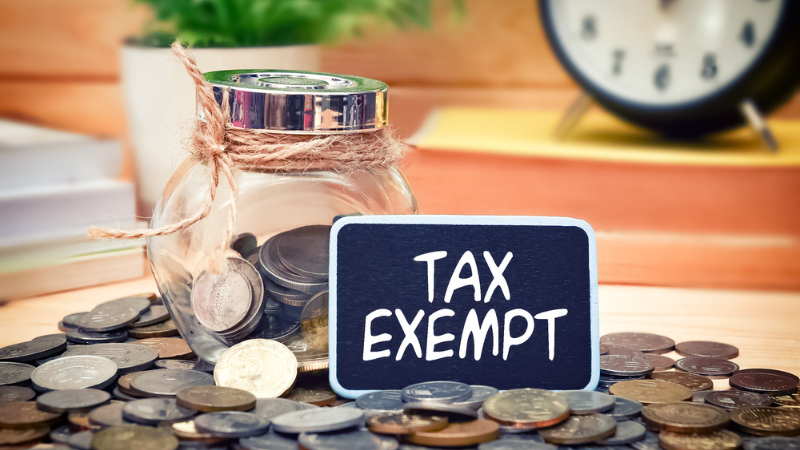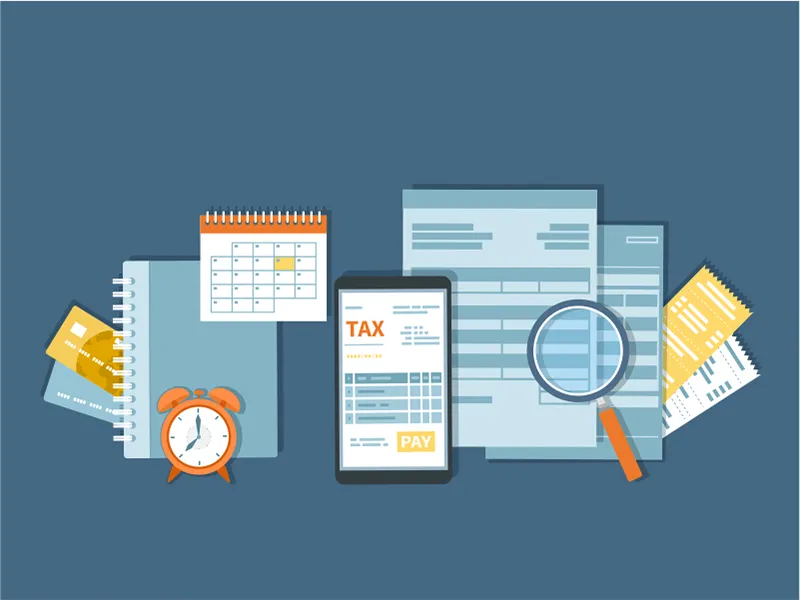
It is the time of the month that is most awaited by all salaried individuals and their families.. the day of salary credit! It is time to meet all the pending financial obligations and chalk out new budgets for the month from the salary. Now we all know that the CTC that is offered is not the same as the take-home salary. The final take-home salary has many deductions that are statutory as well as discretionary. Among many other deductions like contribution to EPF, contribution to EPS, health insurance, etc, there is also a small deduction in the name of professional tax. So what is that little deduction that is mentioned in every payslip and why is it not always standard?
Given below is the meaning of professional tax and other related details of the same.
What is Professional Tax?
As per Article 276 of the Constitution of India, State Governments are entitled to take decisions relating to Professional Tax. Therefore, the decision to levy professional tax and the quantum for the same is dependent on the internal policies of the individual states. The Central Government, however, has the authority of determining the maximum amount of professional tax that can be levied by any state. As per the Central Government regulations, no state can levy professional tax above Rs. 2,500.
The name professional tax suggests that the tax is levied on only professionals like doctors, lawyers, etc. However, that is not the case. Professional tax is levied on all professions, trades, employment, self-employed persons like persons having any business, freelancers, companies, firms, LLPs, Societies, HUFs, Insurance Agents, Tax Consultants, Surveyors, etc. Although professional tax is a form of direct tax levied by the state, it is deductible from the taxable income.
Also Read: All that you need to know about Voluntary Provident Fund deduction
Who is liable to pay professional tax?
Professional tax is collected by the employers on a monthly basis and deposited with the State Government. This payment is reflected as part of a deduction from the payslip of the employee every month. If a person is not employed in any organization, i.e., is self-employed having any business or profession, they need to obtain a Certificate of Enrolment, provided they are in the monetary threshold applicable for levy of professional tax. This limit is state-specific and will therefore vary from state to state levying the professional tax. Employers or professionals having employees in their organization are also liable to pay professional tax subject to the eligibility of professional tax provisions in the state.
Professionals or freelancers have to obtain the professional tax registration number to pay the professional tax against the same. This number can be obtained by submitting the application form for the same along with the required documents as power the requirements of the state in this regard. Such forms can be downloaded from the Professional Tax website of the relevant state.
Also Read: The tax benefits associated with owning a house
What is the professional tax levied in different states?
As discussed earlier, the levy of professional tax is state subjective. Some states in the country do not even levy the professional tax and therefore, in such states, professional tax is completely exempt. The list of states where professional tax is not levied is mentioned below.
- Jammu & Kashmir
- Arunachal Pradesh
- Uttaranchal
- Chhattisgarh
- Rajasthan
- Himachal Pradesh
- Haryana
- Uttar Pradesh
- New Delhi
- Daman & Diu
- Dadra and Nagar Haveli
- Lakshadweep
- Chandigarh
In other states, the quantum of professional tax that is levied depends on various factors like the income level, gender of the individual, etc. Some examples of the states that levy professional tax and such tax levied on them are mentioned below.
| State | Income per month | Amount of tax |
| Andhra Pradesh | Income up to Rs. 15,000 | NIL |
| Andhra Pradesh | Income between Rs. 15,001 – Rs. 20,000 | Rs. 150 per month |
| Andhra Pradesh | Income above Rs. 20,000 | Rs. 200 per month |
| Maharashtra | Income up to Rs. 7,500 (for men) | NIL |
| Maharashtra | Income up to Rs. 10,000 (for women) | NIL |
| Maharashtra | Income between Rs. 7,501 – Rs. 10,000 | Rs. 175 per month |
| Maharashtra | Income above Rs. 10,000 | Rs. 200 per month for 11 monthsRs. 300 in the month of February. |
| Madhya Pradesh | Income up to Rs. 1,50,000 | NIL |
| Madhya Pradesh | Income between Rs. 1,50,001 – Rs. 1,80,000 | Rs. 125 per month |
| Madhya Pradesh | Income above Rs. 1,80,000 | Rs. 212 per month |
| Gujarat | Income up to Rs. 5,999 | NIL |
| Gujarat | Income between Rs. 6,000 – Rs. 8,999 | Rs. 80 per month |
| Gujarat | Income between Rs. 9,000 – Rs. 11,999 | Rs. 150 per month |
| Gujarat | Income above Rs. 12,000 | Rs. 200 per month |
| Tamil Nadu | Income up to Rs. 21,000 | NIL |
| Tamil Nadu | Income between Rs. 21,001 – Rs. 30,000 | Rs. 100 per month |
| Tamil Nadu | Income between Rs. 30,001 – Rs. 45,000 | Rs. 235 per month |
| Tamil Nadu | Income between Rs. 45,001 – Rs. 60,000 | Rs. 510 per month |
| Tamil Nadu | Income between Rs. 60,001 – Rs. 75,000 | Rs. 760 per month |
| Tamil Nadu | Income above Rs. 75,000 | Rs. 1,095 per month |
| Karnataka | Income up to Rs. 15,000 | NIL |
| Karnataka | Above Rs. 15,000 | Rs. 200 per month |
| Odisha | Income up to Rs. 5,000 | NIL |
| Odisha | Income between Rs. 5,001 – Rs. 6,000 | Rs. 30 per month |
| Odisha | Income between Rs. 6,001 – Rs. 8,000 | Rs. 50 per month |
| Odisha | Income between Rs. 8,001 – Rs. 10,000 | Rs. 75 per month |
| Odisha | Income between Rs. 10,001 – Rs. 15,000 | Rs. 100 per month |
| Odisha | Income between Rs. 15,001 – Rs. 20,000 | Rs. 150 per month |
| Odisha | Income above Rs. 20,000 | Rs. 200 per month |
What are the exemptions to professional tax?
There are a few basic exemptions to professional tax across the states that levy them. Some of these exemptions to the professional tax are mentioned below.
- Individuals serving in the army, navy, air force, reservists, and members of the related auxiliary forces.
- Badli workers belonging to the textile industry
- Parents or guardians of the children people with physical or mental disabilities.
- A person having completed 65 years of age (60 years for the state of Karnataka)
- Any person suffering from 40% or more permanent disabilities.
- Persons who are engaged in establishments of any defence ordnance factories.
Conclusion
Professional tax is one of the many taxes levied by the central and state governments. However, unlike other direct tax provisions like TDS and advance tax, profession tax can be deductible from the taxable income. The levy of professional tax although mandatory in the states where it is applicable is quite nominal. Therefore, it does not create a huge burden on the taxpayers and reduces their net take-home salary significantly.
FAQs
Yes, professional tax is mandatory in the states where this tax is applicable and is levied on all salaried and non-salaried persons.
The maximum amount of professional tax that can be levied by any state is Rs. 2,500
If a person liable to pay professional tax does not register for the same or pay the tax amount due, they are liable for a penalty that depends on the guidelines of the individual states. For example, in Maharashtra, wrongful registration or non-registration of a professional tax number is an offense that will attract a penalty of Rs. 5 per day if such an offense is continued. Payment of tax amount after the due date is liable for a penalty of 10% more than the tax amount.
The professional tax is determined based on the guidelines of the individual, states, and other parameters like the income level of the assessees as well as their gender. Therefore, the amount of professional tax levied is different in different states.
Yes. Assessees can login to the professional tax website of the respective state and pay their professional tax through,
-Professional tax registration number
-VAT number
-Tax registration number
-Government-issued Tax ID of 12 digits


























